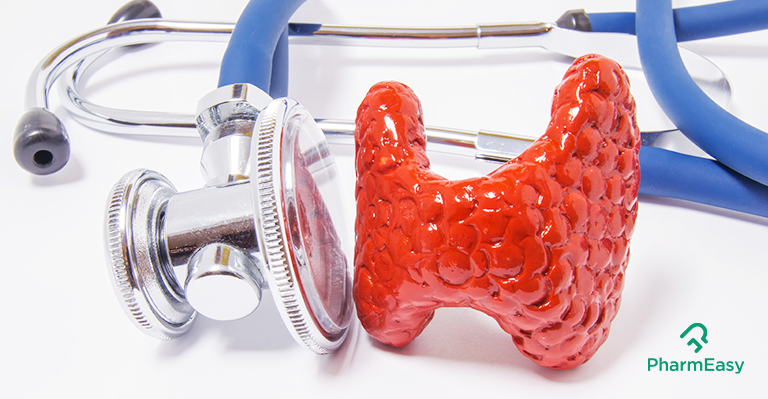What Is The Difference Between Hypothyroidism And Hyperthyroidism?
By Dhwani Jerajani +2 more

Download PharmEasy App




Register to Avail the Offer
Send OTPBy continuing, you agree with our Privacy Policy and Terms and Conditions
By Dhwani Jerajani +2 more
The thyroid is a butterfly-shaped gland situated in the neck, which is responsible for almost all metabolic processes of the body. Thyroid hormones dominate the functioning of the brain, muscles, heart, and other bodily systems. Though it is the same gland, an underactive or overactive thyroid can lead to various conditions that present with distinct symptoms.
Table of Contents
The overall hormonal output of the thyroid gland determines the difference between hypothyroidism and hyperthyroidism. In hyperthyroidism, the gland is deficient in secreting the thyroid hormone required for optimum functioning. In hyperthyroidism, the gland becomes overactive. The most common cause of hypothyroidism is Hashimoto’s disease, an autoimmune condition frequently affecting women than men, in which antibodies are produced against the thyroid hormone. Grave’s disease is the most common form of hyperthyroidism that leads to an enlarged thyroid called a goitre.

The underproduction of the thyroid hormone leads to hypothyroidism (increased TSH level). Hashimoto’s thyroiditis is the most common cause of hypothyroidism that destroys the gland by producing antibodies against the tissues. Thyroiditis may also be caused due to a viral infection. A diet deficient in iodine is another cause of hypothyroidism. Certain radiation drugs, medications for hyperthyroidism, thyroid surgery can also lead to hypothyroidism.
Read More: 7 Effects of Hypothyroidism
During hyperthyroidism, there is an over secretion of thyroid hormones that disrupt metabolic control of the body and reduce TSH levels below normal.
Both these conditions need medical intervention from an endocrinologist or a thyroid specialist. Unfortunately, there is no cure for hypothyroidism and patients need to rely on external thyroid hormone supplements like Eltroxin, etc. Hyperthyroidism needs to be treated with medications or radiation therapy before it can lead to a complicated condition called a thyroid storm.
Ensure you follow the medications religiously, as the thyroid regulates numerous other glands of the body and can hamper their functioning too!
Standard treatment for hypothyroidism involves daily use of the synthetic thyroid hormone levothyroxine (medications Levo-T and Synthroid). This oral medication restores adequate hormone levels, reversing the signs and symptoms of hypothyroidism.
The medication gradually lowers cholesterol levels elevated by the disease and may reverse any weight gain. You’ll likely start to feel better soon after you start treatment.
Several treatments for hyperthyroidism exist. The best approach for you depends on your age, physical condition, the underlying cause of hyperthyroidism and personal preference. Some lines of treatment can be:
Must Read: 8 Best Foods for Thyroid
Comments